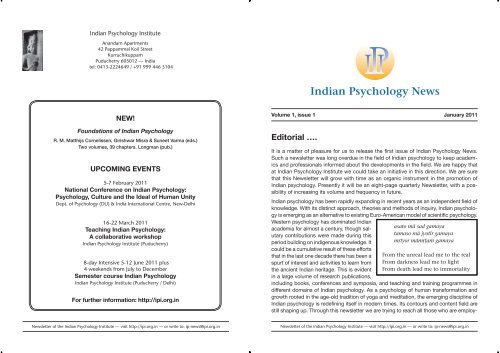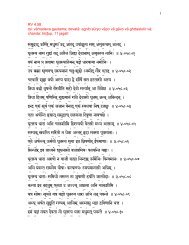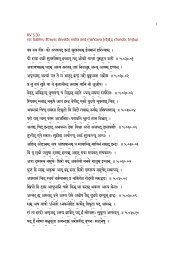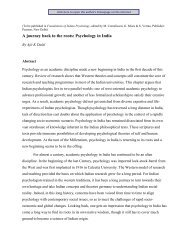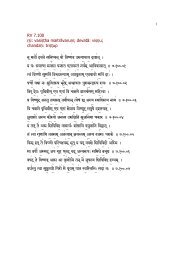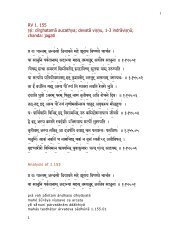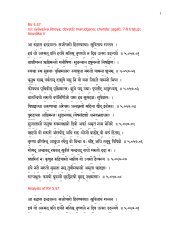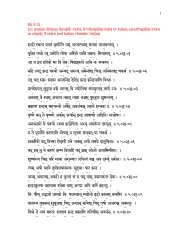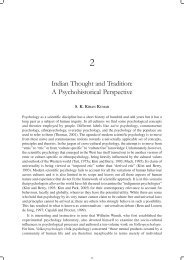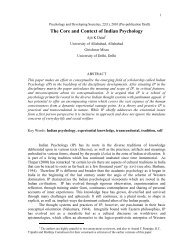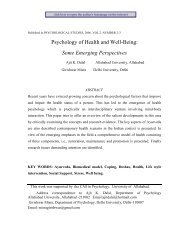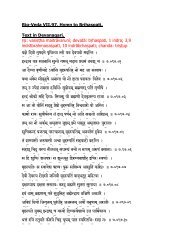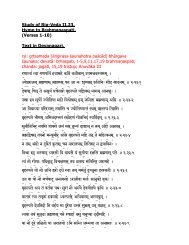ip-news-01-01-web-pr.. - Indian Psychology Institute
ip-news-01-01-web-pr.. - Indian Psychology Institute
ip-news-01-01-web-pr.. - Indian Psychology Institute
- No tags were found...
You also want an ePaper? Increase the reach of your titles
YUMPU automatically turns print PDFs into web optimized ePapers that Google loves.
IPI<strong>Indian</strong> <strong>Psychology</strong> <strong>Institute</strong>Anandam Apartments42 Pappammal Koil StreetKurruchikuppamPuducherry 605<strong>01</strong>2 — Indiatel: 0413-2224649 / +91 999 446 5104<strong>Indian</strong> <strong>Psychology</strong> NewsNEW!Foundations of <strong>Indian</strong> <strong>Psychology</strong>R. M. Matthijs Cornelissen, Girishwar Misra & Suneet Varma (eds.)Two volumes, 39 chapters. Longman (pub.)UPCOMING EVENTS5-7 February 2<strong>01</strong>1National Conference on <strong>Indian</strong> <strong>Psychology</strong>:<strong>Psychology</strong>, Culture and the Ideal of Human UnityDept. of <strong>Psychology</strong> (DU) & India International Centre, New-Delhi16-22 March 2<strong>01</strong>1Teaching <strong>Indian</strong> <strong>Psychology</strong>:A collaborative workshop<strong>Indian</strong> <strong>Psychology</strong> <strong>Institute</strong> (Puducherry)8-day Intensive 5-12 June 2<strong>01</strong>1 plus4 weekends from July to DecemberSemester course <strong>Indian</strong> <strong>Psychology</strong><strong>Indian</strong> <strong>Psychology</strong> <strong>Institute</strong> (Puducherry / Delhi)For further information: http://<strong>ip</strong>i.org.inVolume 1, issue 1 January 2<strong>01</strong>1Editorial ….It is a matter of pleasure for us to release the rst issue of <strong>Indian</strong> <strong>Psychology</strong> News.Such a <strong>news</strong>letter was long overdue in the eld of <strong>Indian</strong> psychology to keep academicsand <strong>pr</strong>ofessionals informed about the developments in the eld. We are happy thatat <strong>Indian</strong> <strong>Psychology</strong> <strong>Institute</strong> we could take an initiative in this direction. We are surethat this Newsletter will grow with time as an organic instrument in the <strong>pr</strong>omotion of<strong>Indian</strong> psychology. Presently it will be an eight-page quarterly Newsletter, with a possibilityof increasing its volume and frequency in future.<strong>Indian</strong> psychology has been rapidly expanding in recent years as an independent eld ofknowledge. With its distinct ap<strong>pr</strong>oach, theories and methods of inquiry, <strong>Indian</strong> psychologyis emerging as an alternative to existing Euro-American model of scientic psychology.Western psychology has dominated <strong>Indian</strong>academia for almost a century, though salutarycontributions were made during thisperiod building on indigenous knowledge. Itcould be a cumulative result of these effortsthat in the last one decade there has been aspurt of interest and activities to learn fromthe ancient <strong>Indian</strong> heritage. This is evidentin a large volume of research publications,asato m sad gamayatamaso m jyotir gamayamtyor mmta gamayaFrom the unreal lead me to the realFrom darkness lead me to lightFrom death lead me to immortalityincluding books, conferences and symposia, and teaching and training <strong>pr</strong>ogrammes indifferent domains of <strong>Indian</strong> psychology. As a psychology of human transformation andgrowth rooted in the age-old tradition of yoga and meditation, the emerging disc<strong>ip</strong>line of<strong>Indian</strong> psychology is redening itself in modern times. Its contours and content eld arestill shaping up. Through this <strong>news</strong>letter we are trying to reach all those who are employ-Newsletter of the <strong>Indian</strong> <strong>Psychology</strong> <strong>Institute</strong> — visit http://<strong>ip</strong>i.org.in — or write to: <strong>ip</strong>-<strong>news</strong>@<strong>ip</strong>i.org.inNewsletter of the <strong>Indian</strong> <strong>Psychology</strong> <strong>Institute</strong> — visit http://<strong>ip</strong>i.org.in — or write to: <strong>ip</strong>-<strong>news</strong>@<strong>ip</strong>i.org.in
2 IP News — January 2<strong>01</strong>1ing <strong>Indian</strong> theories and concepts in research, teaching and <strong>pr</strong>actice, and thereby, partic<strong>ip</strong>antsin shaping the future of this new psychology of the <strong>Indian</strong> origin.It will not be misplaced to state that <strong>Indian</strong> psychology is going through a critical phaseof its growth. There are many choice points, diverse views and visions leading to alternativepathways that <strong>Indian</strong> psychology can possibly take. Again, the dominant sociopoliticalethos plays an important role in the shaping of a disc<strong>ip</strong>line. What directions<strong>Indian</strong> psychology will take in the coming years is anybody’s guess.This Newsletter aims to serve as a forum to keep ourselves updated about the majordevelopments, events and activities within the eld of <strong>Indian</strong> <strong>Psychology</strong>. This forumintends to augment exchange of views, ideas and insights, and dialogue and debateabout the issues of concern to the larger psychology fraternity. The purpose is to communicateand interact through this <strong>news</strong>letter and thereby connect with the largermovement of contemporizing an ancient science.The rst issue of the <strong>Indian</strong> <strong>Psychology</strong> News coincides with a major publication, Foundationsof <strong>Indian</strong> <strong>Psychology</strong>, in two volumes. In this issue we are bringing out thedetails about the contents of these two volumes and excerpts from the introductorychapter of the rst volume about ‘What do we mean by <strong>Indian</strong> psychology?’In this Newsletter we intend to publish short articles, book reviews, announcementsabout academic events, training <strong>pr</strong>ogrammes, research <strong>pr</strong>ojects and opportunities forhigher education in <strong>Indian</strong> psychology. Interested persons can write to mail@<strong>ip</strong>i.org.infor a copy of the <strong>Indian</strong> <strong>Psychology</strong> News.Ajit DalalThe <strong>Indian</strong> <strong>Psychology</strong> <strong>Institute</strong>The <strong>Indian</strong> <strong>Psychology</strong> <strong>Institute</strong> (IPI) was established in 2006 with the specic purposeof bringing to the fore the concepts, theories and <strong>pr</strong>actices from <strong>Indian</strong> psychology andincorporating them into academics and the <strong>pr</strong>ofessional <strong>pr</strong>actice of psychology. Theendeavour is to delineate the theoretical models, specic insights and objective andreliable methods from the <strong>Indian</strong> traditions and explore their viability in contributing tomodern psychology in terms of research, teaching and <strong>pr</strong>actice.Located in Puducherry in the ambience of Sri Aurobindo Ashram, IPI endeavours towork towards effective integration of science and spirituality, and of the intellectual traditionsof the East and the West. IPI is set up to address the human quest for growthand transcendence, and to engage with human suffering through the wealth of <strong>Indian</strong>psychological knowledge.Newsletter of the <strong>Indian</strong> <strong>Psychology</strong> <strong>Institute</strong> — visit http://<strong>ip</strong>i.org.in — or write to: <strong>ip</strong>-<strong>news</strong>@<strong>ip</strong>i.org.inFoundations of <strong>Indian</strong> <strong>Psychology</strong>R. M. Matthijs Cornelissen, Girishwar Misra & Suneet Varma (eds.)Published by: Longman – Pearson Education (New Delhi)Volume 1: Concepts and TheoriesSection 1: The social and philosophical contextK. Ramakrishna Rao — <strong>Indian</strong> psychology: Implications and applicationsAjit K. Dalal — A journey back to the roots: <strong>Psychology</strong> in IndiaR. L. Kashyap — Psychological ideas in the Vedas and their relevance to contemporary psychologyVladimir Iatsenko — On the Vedic symbolism in the light of Sri AurobindoKundan Singh — Beyond mind: The future of psychology as a scienceJohn Pickering — <strong>Indian</strong> psychological thought in the age of globalizationSection 2: Self and personalityKiran Kumar Salagame — Ego and ahankra: Self and identity in modern psychology and <strong>Indian</strong> thoughtPriya & Ajith Prasad — Models of personality in Buddhist psychologySuneet Varma — Integral <strong>Psychology</strong>: A new science of self, personality and psychologyBrant Cortright — An integral ap<strong>pr</strong>oach to our psychic centreBahman A. K. Shirazi — The Su path of self-transformationShivantika Sharad — Being an authentic self: Some insights from the lives of Sri Aurobindo and Mahatma GandhiSection 3: Pathways to knowledgePeter Sedlmeier — <strong>Indian</strong> psychology and the scientic methodWilliam Braud — Integrating yoga epistemology and ontology into an expanded integral ap<strong>pr</strong>oach to researchGirishwar Misra — Knowing in the <strong>Indian</strong> traditionMatthijs Cornelissen — What is knowledge? A reection based on the work of Sri AurobindoS. R. Bhatt — The noetic <strong>pr</strong>ocess (citta vrithi): A Thervda Buddhist viewGirishwar MisraSunil D. GaurAnand C. ParanjpeKavita A. SharmaMinati PandaSection 4: Affect, motivation and creativity— <strong>Psychology</strong> of emotions: Some cultural perspectives— Why am I here? Implications of self and identity for conceptualizing motivation— The <strong>pr</strong>inc<strong>ip</strong>les and <strong>pr</strong>actice of karma yoga in the writings and life of B. G. Tilak— From dejection to action: A narrative analysis of the transformation of Arjuna and Yudhisthira— Cultural construction of creativity: Dualism and beyondVolume 2: Practical ApplicationsSection 1: Health and healingKapil Kapoor — Philosophy of healing in <strong>Indian</strong> medicineR. L. Bijlani — Integral psychology: More than a tool for health and happinessAjit K. Dalal — Folk wisdom and traditional healing <strong>pr</strong>actices: Some lessons for modern psychotherapiesAlok Pandey — Psychotherapy and <strong>Indian</strong> thoughtMichael Miovic — Psychotherapy and Integral Yoga <strong>Psychology</strong>K. M. Tr<strong>ip</strong>athi — Concept and scope of <strong>pr</strong>atyahara in management of mental healthSection 2: EducationNeeltje Huppes — Integral education: An application of <strong>Indian</strong> psychologyP. Ram Manohar — The blending of healing and pedagogy in yurvedaBharati Baveja — Situating teacher education in the <strong>Indian</strong> context: A paradigm shiftVinita Kaushik Kapur — Krishnamurti and value educationAnjum Sibia — Education for life: The Mirambika experienceSection 3: Social issuesAnand Prakash — Exploring images used for individual-organization interface: Experiences and reectionsKumar Ravi Priya — Broadening of consciousness: A healing <strong>pr</strong>ocess among survivors of Kachchh earthquakeR. S. Pirta — Resolution of social conicts: An <strong>Indian</strong> modelAnjali Singh — Lalan-palan: A psycho-spiritual experience for the <strong>Indian</strong> motherP. Kapur & G. Misra — Being human the Sikh way: Some psychological reectionsKittu Reddy — Organizational transformation through consciousness-centred training in the <strong>Indian</strong> ArmyFor more information, see http://<strong>ip</strong>i.org.in
6 IP News — January 2<strong>01</strong>1IP News — January 2<strong>01</strong>1 3by yoga and meditation actually does lead to greater social effectiveness and lifesatisfaction.An anecdotal but undoubtedly historical support for this comes, besides,in the form of the life of the Buddha, a living example of selessness, and yet,one of the most inuential individuals who ever lived.Regarding the need to overcome the rst im<strong>pr</strong>essions our senses give us, this is ofcourse quite common in modern science. In the beginning of the modern, scienticera, the sense-im<strong>pr</strong>ession of a “rising sun” was discarded in favour of a model inwhich the earth turns around its axis. Quantum mechanics does not t in our ordinarysense-based view of reality at all. Such things are accepted because they canstill be <strong>pr</strong>ocessed mathematically and used technologically. In a similar way, yogaand meditation have led to insights that are hard to grasp for the ordinary sensebasedmind—for example “pure consciousness”, or the <strong>pr</strong>esence of “the Divine” asour deepest identity—but they can be made real experientially, and then they havea perfectly concrete, benecial effect on our psychological existence.Though the benecial effects of yoga and meditation on our subjective sense ofwell-being have been shown to exist in numerous researches, they may still not bethe most important contribution of the <strong>Indian</strong> tradition to psychology as a science.The most interesting might well turn out to be what the <strong>Indian</strong> tradition can contributein terms of detailed, incisive and reliable psychological knowledge. For weshould not forget that the ancient rishis were not only seeking “ananda”; they werealso seeking to overcome ignorance; they wanted true, undistorted knowledge. Andreal knowledge meant for them knowledge of the self, and the reason for this inwardlook is clear: everything we know or do, we achieve through our own nature. If ourown nature is weak or distorted, everything we know or do will be tarnished by ourweaknesses and distortions. So the rst necessity is to clean up, to purify and toget to know our own nature as thoroughly as we can. And this is exactly what jnanaand purna yoga are about: to purify the inner instrument of knowledge so that it can<strong>pr</strong>ovide undistorted truth about reality as it really is. If this purication and transformationare extended to the inner instruments of action, this will automatically leadto action which is less ego-based andmore in harmony with the whole.Given the treasures of psychologicalknowledge one can nd in ancient scr<strong>ip</strong>tureslike the Rig Veda, the Upanishads,and in the works of modern yogis like SriAurobindo, it would be a great loss forthe rishis developed something whichmainstream psychology did not: arigorous and effective method to developdetailed and reliable knowledge of thesubjective domain.humanity if modern <strong>Psychology</strong> chose to ignore this contribution. For the rishis developedsomething which mainstream psychology did not: a rigorous and effectivemethod to develop detailed and reliable knowledge of the subjective domain. Andthis might well be the one thing humanity is <strong>pr</strong>esently most in need of.IPI is active in varied areas of <strong>Indian</strong> psychology, such as designing and conductingcourses, seminars, conferences, workshops, research <strong>pr</strong>ojects and training <strong>pr</strong>ogrammesfor teachers, students and the general public. It has been working towards compilingspecialised articles and textual material as textbooks, and towards the disseminationof information and other related resource material through the IPI <strong>web</strong>site. The <strong>Institute</strong>networks with other related organisations and people working in the eld and maintainsa database of available textual material. IPI is deeply involved in yoga, and uses it for thestudy of IP related ideas and concepts, for the exploration of levels of consciousness andtheir inter-relations, for research on IP <strong>pr</strong>ocesses and their dynamics, and in the applicationof IP in working on oneself and with others, on the individual level as well as in groups.The signicance of the lotus is not to be found by analysing thesecrets of the mud from which it grows here; its secret is to befound in the heavenly archetype of the lotus that blooms for everin the Light above …[Y]ou must know the whole before you can know the part and thehighest before you can truly understand the lowest. That is the<strong>pr</strong>omise of the greater psychology awaiting its hour ...What do mean by <strong>Indian</strong> psychology?— Sri Aurobindo, Letters on Yoga, p.1609The Introduction to Foundations of <strong>Indian</strong> <strong>Psychology</strong> explains the term <strong>Indian</strong> <strong>Psychology</strong>as follows:By <strong>Indian</strong> psychology we mean an ap<strong>pr</strong>oach to psychology that is based on ideasand <strong>pr</strong>actices that developed over thousands of years within the <strong>Indian</strong> sub-continent.In other words, we use the word ‘<strong>Indian</strong>’ to indicate and honour the origin ofthis ap<strong>pr</strong>oach to psychology—the origin of the underlying philosophy, the conceptualframework, the methods of enquiry, and the technology of consciousness thatit uses to bring about psychological change and transformation. It may be usefulto make explicit that we do not use the word ‘<strong>Indian</strong>’ to localize or limit the scopeof this ap<strong>pr</strong>oach to psychology; we do not mean, for example, ‘the psychology ofthe <strong>Indian</strong> people’, or ‘psychology as taught at <strong>Indian</strong> universities’. <strong>Indian</strong> Ppsychologyis also not about the past, but about the <strong>pr</strong>esent and the future. <strong>Indian</strong>Newsletter of the <strong>Indian</strong> <strong>Psychology</strong> <strong>Institute</strong> — visit http://<strong>ip</strong>i.org.in — or write to: <strong>ip</strong>-<strong>news</strong>@<strong>ip</strong>i.org.inNewsletter of the <strong>Indian</strong> <strong>Psychology</strong> <strong>Institute</strong> — visit http://<strong>ip</strong>i.org.in — or write to: <strong>ip</strong>-<strong>news</strong>@<strong>ip</strong>i.org.in
4 IP News — January 2<strong>01</strong>1IP News — January 2<strong>01</strong>1 5psychology is about how ideasand <strong>pr</strong>actices from the <strong>Indian</strong> traditioncan be used to tackle issuesin contemporary psychology andconstructively inform its disc<strong>ip</strong>linary<strong>pr</strong>actice by helping withtheory building and application.We hold that <strong>Indian</strong> psychology asWe do not look at <strong>Indian</strong> psychology assomething that belongs only to India or thepast, but as a rich source of psychologicalinsight and know-how that can be utilisedto create a better future for the whole of humanity.a meta-theory and as an extensive body of related theories and <strong>pr</strong>actices hassomething essential and unique to contribute to the global civilization as a whole.What is it that the <strong>Indian</strong> civilization can contribute to psychology?The most important contribution which the <strong>Indian</strong> tradition can make to psychology,and with that to our <strong>pr</strong>oud global civilization, may well be something that is utterlysimple in its basic <strong>pr</strong>inc<strong>ip</strong>le, but at the same time, sur<strong>pr</strong>isingly far-reaching in itsconsequences: its basic method of enquiry.When modern psychology discovered in the beginning of the 20th century that introspectionwas not a very reliable method of enquiry, it did not discover anythingnew. The <strong>Indian</strong> civilization had discovered this thousands of years ago. What wasdifferent however, was how modernity reacted to this discovery. It is good to standstill for some time at what happened, for the consequences have been far-reachingand by and large negative. Modern psychology escaped from the <strong>pr</strong>oblem by redeningpsychology as the science of behaviour. Initially this must have seemeda splendid idea and the whole eld fell for it with a stunning degree of unanimity:psychology suddenly became a real science, purely objective, third-person, dealingin undisputable facts. It took remarkably long before it began to dawn at what costall this had come: By focusing exclusively on outer behaviour, almost everything thatreally matters to people had disappeared from view. And so, as a result, truth, love,joy, beauty, even meaning itself, all got an air of being intangible, unsubstantial --and here comes the hitch for psychology as a science -- difcult to research. As behaviourwas easier to study in small animals than in people, cognitive behaviour wasin the fties mainly studied in rats and pigeons. These “laboratory animals” were rststarved and then taught random behaviour with the help of rewards in the form offood-pellets. And now came the real <strong>pr</strong>oblem: the results of these animal studieswere happily applied to human education, and so we have now children who aretaught what at least to them appears as random facts, with the help of marks anddegrees. And once children are systematically trained to do anything whatsoever aslong as it <strong>pr</strong>oduces high marks, is it sur<strong>pr</strong>ising that we end up with ‘grown-ups’ whoare willing to do anything as long as it <strong>pr</strong>oduces money? So a relatively innocentlooking choice regarding scientic methodology at the beginning of last centuryNewsletter of the <strong>Indian</strong> <strong>Psychology</strong> <strong>Institute</strong> — visit http://<strong>ip</strong>i.org.in — or write to: <strong>ip</strong>-<strong>news</strong>@<strong>ip</strong>i.org.inseems to have led to one of the most serious <strong>pr</strong>oblems our global civilization is<strong>pr</strong>esently facing: an ever-growing epidemic of corruption and money-mindedness.It is obviously difcult to <strong>pr</strong>ove the link, and one may well argue that modern psychologyis not anymore about “rats and stats”. We have now the well-established quantitativemethodology of statistically <strong>pr</strong>ocessed surveys, more recently the <strong>pr</strong>omiseof qualitative, narrative analysis, and a growing awareness of how knowledge getssocially constructed. But none of this goes deep enough. Good science goes belowthe surface, but these ap<strong>pr</strong>oaches don’t allow that to happen. The statistical surveysare limited to what re<strong>pr</strong>esentative populations of large numbers of lay people canreport about themselves; the narrative analysis cannot go beyond what concernedlay people already happen to know. Both have their use, no doubt, but the rst cannotdeliver more than a kind of sophisticatedpsycho-social geography, the second will ndit difcult to rise beyond high quality journalism.In case it is not clear whether this harsh criticismof mainstream psychology is justied, itmay help to consider what would have happenedto astronomy if it would have followedWhat would have happened toastronomy if it had limited itselfto quantitative analysis of whatlarge, re<strong>pr</strong>esentative populationsof lay people see in the eveningsky?the path taken by psychology. What if astronomy had limited itself to quantitativeanalysis of what large, re<strong>pr</strong>esentative populations of lay people see in the eveningsky? It is clear that what people see is informed by their culture, it is also clear thatone single “qualitative” interview with a farmer living high in the mountains givesbetter information about the stars than a large study of people living in the plains.But still, the real road ahead for astronomy was to forget about all this, and ensurethat a few highly trained <strong>pr</strong>ofessionals could make use of the most powerful andreliable pieces of equ<strong>ip</strong>ment available.Interestingly, this is exactly what the <strong>Indian</strong> tradition has done in the eld of psychology.The ancient rishis and yogis realized, like their modern counterparts, that whatordinary people know about themselves is not worth much, but they did not shyaway from the <strong>pr</strong>oblem. Instead they analysed the causes for this human incapacityand then they set to work on methods to overcome these defects. They found thatthe two main <strong>pr</strong>oblems were egoism, and a too naive reliance on what the sensesmake us believe. Regarding the former, they found that the egoism ex<strong>pr</strong>essed itselfthrough desires, <strong>pr</strong>eferences and the natural “vested interests” we all have in theoutcome of our self-observations. All such factors lead in their own way to distortions.What is more interesting is that they found that it is actually possible to removethese obstacles, and that this not only leads to greater clarity of thought, butalso to a remarkable type of unconditional inner joy and effectiveness in action. Thelatter may be a sur<strong>pr</strong>ise to those who have been brought up on the virtues of “egostrength”,but there is convincing scientic evidence that the detachment furtheredNewsletter of the <strong>Indian</strong> <strong>Psychology</strong> <strong>Institute</strong> — visit http://<strong>ip</strong>i.org.in — or write to: <strong>ip</strong>-<strong>news</strong>@<strong>ip</strong>i.org.in


